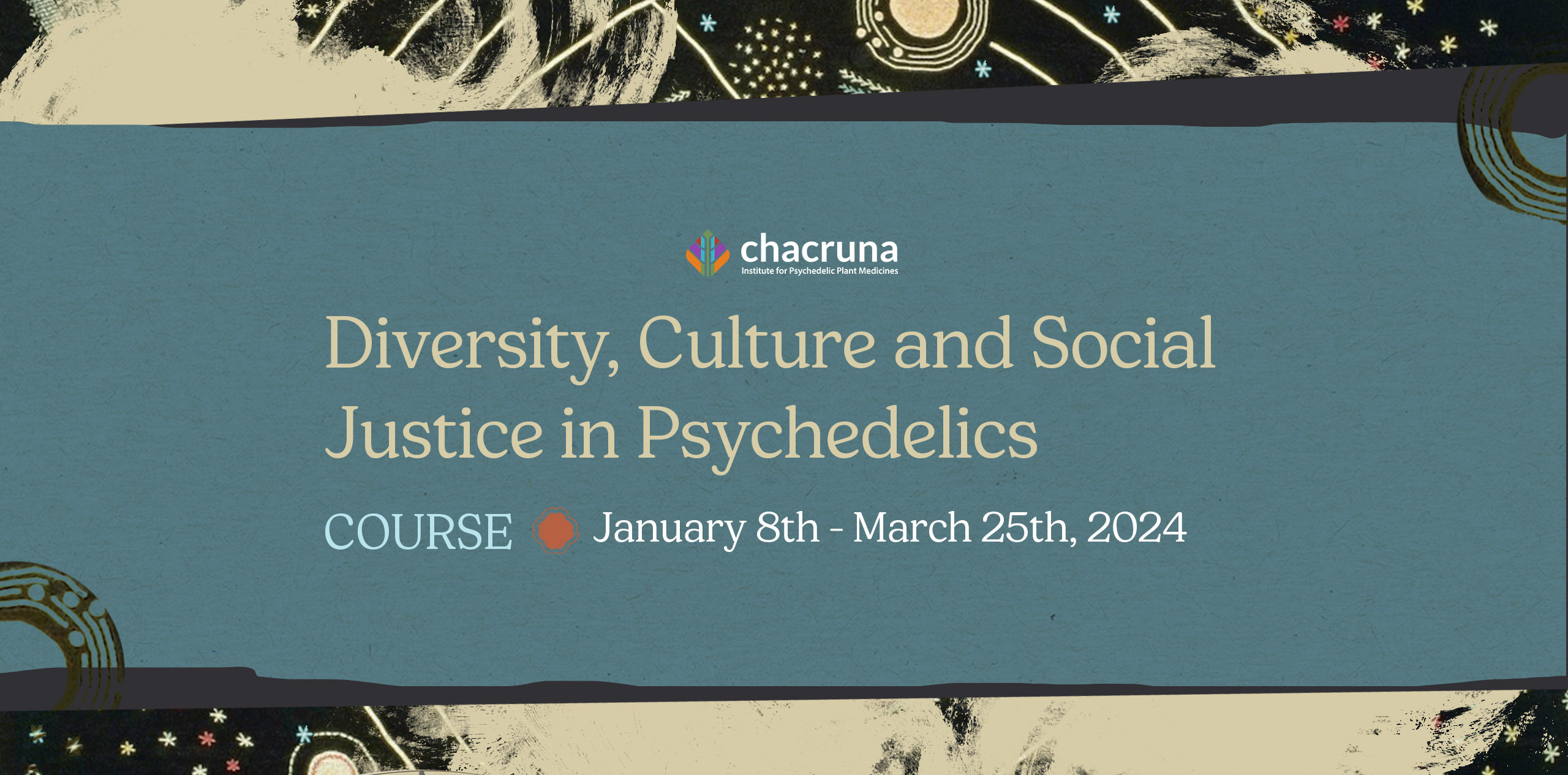- Press Release – Chacruna Receives $150,000 Grant from Kindred Trust - June 10, 2025
- Events Production Internship (OPEN) - June 10, 2025
- Course: Roots of Psychedelic Therapy: Shamanism, Ritual and Traditional Uses of Sacred Plants - June 6, 2025
January 8th – March 25th 2024, 10:30am-12pm PST/1:30pm-3pm EST
Price $700 USD
Price $320 for CE credits
CE Credits Offered: 16 total
This course is a partnership between Chacruna and University of Ottawa, School of Psychology.
This course, taught by leading experts and the first of its kind in the psychedelic field, will teach students to consider the cultural, social, historical, and economic context that influences the so-called “psychedelic renaissance.” Students will be introduced to basic concepts around psychedelics and justice, diversity, equity, and inclusion (JEDI). The goal of the course is to explore the ways in which psychedelics influence and are influenced by factors such as social justice, privilege, and diversity and to better understand their reciprocal influences on psychedelic science, therapies, and praxis. Topics include: anti-racism, implicit bias, queer aspects, intersectionality, cultural humility, social identity, power and privilege, healing the racial divide, uses of Indigenous plant medicines, and challenges around their mainstreaming and globalization. This course is intended to be intellectual, personal, and experiential. We will examine structural issues that act as systemic barriers to JEDI efforts. Students will also be challenged to think critically and confront aspects of themselves, their beliefs, behaviors, and needed areas of growth, such as their individual, familial, and group legacies of privilege and disadvantage, their personal commitments to social justice, advocacy, and social change in the psychedelic community and the world more broadly. These perspectives are crucial for deepening our understanding of the expanding future of psychedelic medicine in ways that are equitable and just.
To read more on our recording policy for our trainings and answers to other frequently asked questions, please view our FAQ.
Learning Objectives
At the end of the program, participants will be better able to…
- Discuss Liberation Psychology and Cultural Humility at the philosophical and practical levels
- Critique the current therapeutic and research paradigms and approaches through the lens of Liberation Psychology and Cultural Humility
- Analyze how crime and drug policies impact minoritized peoples in the US
- List and explain terms frequently used in the study of race/ethnicity
- Analyze how racism impacts the mental health of people of color
- Explain the potential for psychedelics to relieve racial stress and trauma
- Discuss intersectionality theory and praxis
- Discuss the importance of intersectional cultural humility in psychedelic-assisted therapy and research
- Compare and analyze the different elements of traditional uses of sacred plant medicines versus the modern Western practice of psychedelic-assisted therapy
- Explain and analyze misconceptions related to the notions of set and setting and integration often discussed within the psychedelic field
- Discuss the history of psychedelic treatment of gay people in psychedelic therapies designed to alter their sexual or gender identities
- Analyze the current challenges sexual and gender minorities may face when seeking psychedelic therapy
- Explain core issues surrounding the mainstreaming and globalization of psychedelics and the way they affect marginalized groups
- List ways in which non-Indigenous folks can honor Indigenous knowledge and practices and give back to Indigenous communities
- Explain how the War on Drugs has negatively impacted communities of color, low-income populations, and individuals with mental health and substance use disorders
- Discuss alternatives to incarceration and ways the US can shift away from a system of punishment towards a paradigm of accountability and healing
Information on Continuing Education Credits for Health Professionals
- CE credits for psychologists are provided by the Spiritual Competency Academy (SCA) which is co-sponsoring this program. The Spiritual Competency Academy is approved by the American Psychological Association to sponsor continuing education for psychologists. Spiritual Competency Academy maintains responsibility for this program and its content.
- The California Board of Behavioral Sciences accepts CE credits for LCSW, LPCC, LEP, and LMFT license renewal for programs offered by approved sponsors of CE by the American Psychological Association.
- LCSW, LPCC, LEP, and LMFTs, and other mental health professionals from states other than California need to check with their state licensing board as to whether or not they accept programs offered by approved sponsors of CE by the American Psychological Association.
- SCA is approved by the California Board of Registered Nursing (BRN Provider CEP16887) for licensed nurses in California. RNs must retain their certificate of attendance for 4 years after the course concludes.
- For questions about receiving your Certificate of Attendance, contact [email protected]
- For questions about CE, contact Spiritual Competency Academy at [email protected].
CE Credit Requirements
- Student must be in attendance with their camera on for the entirety of the class session
- Student must be actively participating in the class session (asking questions, contributing to discussion, etc.)
- Student must fill out an evaluation and assessment form at the end of the course, which will be provided by Chacruna
- Collective CE credits will be awarded at the end of the course given that all of the above requirements are met
*please note that you must purchase a ticket for CE credits on Eventbrite in order to receive CE credits
*please note that if you miss a class, you will not be awarded any CE credits for the entire course and cannot be refunded for the CE cost – you must attend all classes in order to receive CE credits
*please note that the first and last class do not count towards CE credits
Chacruna Certificate Requirements
At the end of the course, students will have the option to receive a certificate from Chacruna for the completion of this course. In order to receive this certificate, students must complete one of the following options:
A. Submit a final individual paper of 1,800 to 2,000 words, following Chacruna’s Chronicles Guidelines (the best papers will be selected to be published on the Chacruna site) *please note that the 2,000 word count should include footnotes and references; papers that go beyond 2,000 total words will not be accepted.
B. Submit a final group paper consisting of 2,000 words per person (i.e. if there are two people writing the paper, it should be a total of 4,000 words; if there are three people writing the paper, it should be a total of 6,000 words) *please note that the 2,000 word count per person should include footnotes and references; papers that go beyond 2,000 total words will not be accepted.
C. Submit a paper with internal reflection of what you have learned throughout this course
D. Pitch another specific proposal to submit (i.e. mini-documentary, video lecture, creation of a podcast.)
E. Students will have the option to do an art project related to the contents of the course
F. Students will have the option to conduct a “Family History.” This would consist of the student interviewing their family members to contextualize their life and experience, to understand their roots, and also talk about their local community/ lands/ social environment where they came from and/or are located
*Students will also have the option to opt out of receiving the certificate
*The project submitted must be unique and created specifically for the course – you cannot submit a project that you created previously or submitted elsewhere
Class Recordings and Lecture Slides Policy
Recordings of the lectures will be sent to the students a week before the class is scheduled to take place.
Lecture slides from the classes may be provided to the students at each professor’s discretion. We encourage everyone to come to each class in-person and on time as we cannot guarantee providing these resources in all circumstances.
You can find more information to Frequently Asked Questions here.
Course Structure
- Students will watch the lecture on their own time
- There will be a live 1.5 hour discussion on Zoom with the professor the following week
Refund Policy click here
Classes
Click on the class to read the description
Class One – Introduction
Monday, January 8th, 2024, 10:30-12pm PST/1:30-3pm EST
Professors: Dr. Ligia Duque Platero and Dr. Bia Labate
In this initial class, students will introduce themselves to others in the course, be introduced to the professors and their backgrounds, and gain an understanding of the curriculum and program. Students will leave with preparation for the following classes being taught and a general understanding of the topics that will be discussed throughout the course.
Class Two – Decolonizing our Approaches: Embodying the philosophy and practice of Liberation Psychology and Cultural Humility in Psychedelic Assisted Therapy and Research
Monday, January 22nd, 2024, 10:30-12pm PST/1:30-3pm EST
Professors: Dr. Joseph McCowan
Our movements for social justice and the modern Psychedelic Renaissance are not separate, but intertwined. Both involve our collective efforts to heal the harms of our pasts, reclaim our human rights, challenge powerful structures and systems, bring balance to areas of imbalance, and prioritize and center what our society has exiled and marginalized. Liberation psychology and Cultural Humility provide the philosophical and practical foundation for us all to be active participants in these movements, regardless of our cultural background, intersectional identity, or our current role or position. Liberation Psychology and Cultural Humility are uniquely aligned with the psychedelic ethos, helping us see and appreciate the complexity, interconnectedness, and interdependence of all things, from society, to culture, to community, and within ourselves and our own psyches. This class will center marginalized and oppressed voices, while decentering dominant voices. There will be focus and discussion on decolonizing our approaches and practices and developing a reflective and critical lens in looking at our current practices and approaches. Learners will engage with a multiplicity of perspectives, voices, backgrounds, practices, and approaches, helping them envision and create new models and approaches for underserved and marginalized groups in psychedelic assisted therapy and research.
Class Three – The Importance of Cultural Competency and Anti-Racist Education for Psychedelic Assisted Therapy: Understanding Aversive Racism and the Power of Identity
Monday, January 29th, 2024, 10:30-12pm PST/1:30-3pm EST
Professors: Dr. Sonya Faber
Participants utilizing psychedelic-assisted therapy are in a position of increased vulnerability because it strips people of their normal psychological protections while they also endure immobilization until effects of the psychedelic substances abate. For BIPOC, psychological protections used to navigate interracial interactions are compromised and, therefore, therapy paradigms not centered in understanding the experience and needs of BIPOC people put them at additional risk of harm. Facilitators must unpack their own implicit biases before they can administer these therapies to BIPOC. Multiple studies have shown that people exhibit greater empathy to individuals with a similar skin color and the current situation is that, in the USA, Canada, and Europe, most psychedelic therapists are white, and, as such, most clients of color will be seeing a white therapist. Therefore, it is important to shine a light on cultural competency and implicit bias. There are ways to improve cultural competency; racially-based sensitivity to others’ pain can move from implicit to explicit if made salient. Being a culturally competent therapist requires a better understanding of the tools of systemic racism. Understanding aversive racism and how it develops is a first important step. This class will focus on key issues including aversive racism and the power of Identity.
Class Four – Queer Aspects of Psychedelic Experience
Monday, February 5th, 2024, 10:30-12pm PST/1:30-3pm EST
Professors: Dr. Clancy Cavnar
This class will explore the dimension of gender-diverse people and sexual orientation in the context of psychedelics. Historically, psychedelics have been used by LGBTQA+ communities as a tool for self-therapy and a creative source among cultural outcastes. We will look at how queer people have used psychedelics to build community and explore identity. This class will also examine a dark period when psychedelics were used to treat homosexuality (“conversion therapy”) in clinics internationally, some times in aversive therapy scenarios. We will look at the ways psychedelic therapy can be made more accessible to gender- and sexually-diverse people, and the ways that queer people might be accommodated and treated with more understanding. The class will familiarize attendees with the particular needs of the queer population in regard to treatment, their continuing struggle to have aspects of gender and orientation respected in clinical contexts with psychedelics, the continuing need for research on this population, and the ways psychedelics can help resolve some of the trauma of being queer in a homophobic society.
Class Five – From Shamanism to Psychedelic-Assisted Therapy and Back
Monday, February 12th, 2024, 10:30-12pm PST/1:30-3pm EST
Professors: Dr. Bia Labate
While, in the West, psychedelics have often been related to the either the realm of the “sacred” or “therapy,” in traditional contexts, the uses of these substances can often be found at the intersection of diverse areas of life; including politics, medicine, shamanism, religion, aesthetics, knowledge transmission, socialization, and celebration. This class will discuss what traditional uses of sacred plants can teach us about the consumption of drugs in general, and in the context of psychedelic therapies in particular. Can we bridge the world of ceremony with sacred plants to that of psychedelic therapy, or are these ultimately irreconcilable practices, founded on incompatible epistemologies? We will examine different concepts around the notions of “healing” (physical properties of substances versus healing as a relational and cosmological enterprise); settings (individual versus collective); the distinction between synthetics and plant teachers (molecules versus interspecies communication); who must consume the psychedelic substance for healing to occur (therapists, clients, or both); for what ages practices are allowed (children or adults); dosing (standard versus individualized); training (initiation or formal), different ritual techniques, and how “excess” and malpractice are defined. We will also point out some common misunderstandings in the psychedelic field around the notions of set and setting, as well as problematize the widespread concept of “integration.” We will conclude by calling the attention of students, activists, therapists, and researchers to honor the Indigenous roots of the psychedelic movement, engage in decolonial practices, culturally sensitive and community-based research, reciprocity, and relationships with Indigenous communities.
Class Six – Psychedelics and Racial Justice: Equity and Access
Monday, February 26th, 2024, 10:30-12pm PST/1:30-3pm EST
Professors: Monnica Williams, Ph.D.
Psychedelics have been studied for the treatment of numerous mental health conditions, as an avenue for personal growth, and for enhancing well-being. However, psychedelic research studies have largely excluded people of color, leaving important questions unaddressed for these populations. Additionally, the War on Drugs has created racial barriers to access and estrangement from many psychedelic communities, even as decriminalization is expanding. Dr. Williams will discuss the impact of first-wave drug research abuses, social policies, and stereotypes on communities of color. She will discuss ethnic minority mental health, and how psychedelic therapies may help or hinder healing for racialized individuals. Also discussed are next steps in ensuring that access to culturally-informed care is prioritized, including the importance of culturally-informed approaches and training experiences of psychedelic therapists of color, as several psychedelics move into late phase trials and expanded access.
Class Seven – Challenges on Contemporary Expansion of Forest Medicines: Gender and Cross-Cultural Issues
Monday, March 4th, 2024, 10:30-12pm PST/1:30-3pm EST
Professors: Dr. Ligia Platero
This class will discuss some challenges and paradoxes of the contemporary global expansion of the so-called “forest medicines,” including ayahuasca (the most famous substance), from a historical and anthropological perspective. First, the professor will reflect about her own experience as an anthropologist who is doing fieldwork in ayahuasca rituals as a queer woman in Brazil, both in the Amazon in Indigenous villages and in urban settings like Rio de Janeiro. Next, she will provide an overview on the forest medicines and their contemporary uses: rapé (tobacco snuff), sananga, kambô, and muká. In the second part, she will focus particularly on the case of the Yawanawá Indigenous people of Acre, Brazil, offering an overview of the process of colonization and the action of religious missionaries for centuries. The class will describe different phases of Yawanawá history, from the rubber boom era to the “rescue of culture” in the 1980s, when shamanic practices were recovered. The class will conclude by discussing the IV Indigenous Conference of Ayahuasca, which happened in Acre, Brazil, in September 2022, when Indigenous leaders presented their concerns about the expansion and globalization of forest medicines. It is hoped that this class offers a good contribution to the reflection on topics such as shamanic tourism, cross cultural alliances, cultural appropriation, and gender relations in shamanic contexts. Attention will be given to both city and forest, and to Indigenous and non-Indigenous perspectives.
Class Eight – Understanding Racial and Ethnic Minorities and the Role of Entheogens in Healing the Racial Divide
Monday, March 11th, 2024, 10:30-12pm PST/1:30-3pm EST
Professors: Dr. Darron Smith
The class will examine the economic and political conditions in US society that give rise to the development and persistence of systemic racism and other forms of oppression that stigmatized minorities (Black, Indigenous, and people of color) face in virtually every domain from educational policy to health care equity. Race still matters. Participants will learn the historical origins of white racial ideologies and how those concepts saturate the imagination of most Americans (whether or not they realize it) while familiarizing themselves with basic sociological theory. This course is intended to give students a broad understanding of race relations in society and how psychedelic (e.g., MDMA, psilocybin, DMT, ayahuasca) might be helpful to heal the racial divide. As such, the fundamental objective of this course is to learn concepts germane to study of racial and ethnic relations in the US.
Class Nine – Drug War – The War on Drugs, The New Jim Crow, and Moving Away from Punishment as Our Response to Harm
Monday, March 18th, 2024, 10:30-12pm PST/1:30-3pm EST
Professors: Sia Henry
Despite growing public interest in psychedelics, it is important to understand the broader political and social history that led to their criminalization in the first place. This class will discuss the history of racism in the United States that ultimately led to the War on Drugs and mass incarceration. In doing so, it will explore why civil rights activist, Michelle Alexander, declared the War on Drugs the “New Jim Crow,” especially examining what this has meant for low-income communities of color. This class will also touch on conditions of confinement for students to better understand the often unseen harms of the drug war. These harms have been especially detrimental to already vulnerable populations, particularly those with physical and developmental disabilities and individuals with serious medical and mental health issues. Finally, the professor will present a number of steps our society can take to not only end the War on Drugs but construct healthy ways to realize a safer society while addressing harm and creating spaces for healing and accountability. Some of these steps include embracing restorative justice processes that have a long and effective history in African and Indigenous communities around the world.
Class Ten –Conclusion
Monday, March 25th, 2024, 10:30-12pm PST/1:30-3pm EST
Professors: Dr. Ligia Duque Platero and Dr. Bia Labate
In this final class, we will strive to summarize everything taught throughout the course. In doing so, we will recap the main concepts, highlight the main moments, and give folks a chance to voice any significant takeaways about the topics discussed. We will also make a critique of the course and think of ways to improve it for future teachings.
Professors
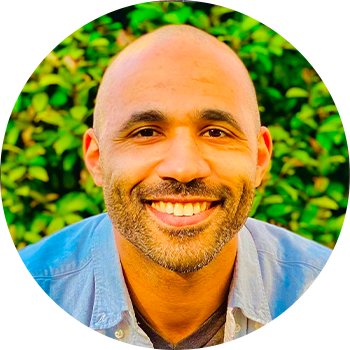
Dr. Joseph McCowan, PsyD, is a licensed clinical psychologist, currently working in Los Angeles as a Co-therapist and Supervisor in the MAPS sponsored Phase 3 clinical trials of MDMA-Assisted Therapy for PTSD. Additionally, Joseph supports the MAPS Therapy Training Program as a training assistant, and supports efforts toward increasing the diversity of therapists and participants in the MAPS clinical studies as part of the MAPS Diversity Working Group. Outside of his work with MAPS, Joseph practices at the California Center for Psychedelic Therapy where he provides Ketamine Assisted Psychotherapy (KAP) and Psychedelic Integration Therapy. Along with his training in MDMA Assisted-Therapy and Ketamine Assisted-Therapy, Joseph is trained in multiple other psychedelic assisted therapy approaches including Psilocybin Assisted-Therapy for Depression (COMPASS Pathways) and 5-MEO-DMT Assisted-Therapy for Depression (Beckley PsyTech). Joseph is deeply passionate about furthering education and awareness of the healing benefits of psychedelics for communities of color and in working to improve mental health outcomes for historically underserved communities and is a member of Chacruna’s Racial Equity and Access Committee. Joseph received his undergraduate degree in psychology from the University of California, Santa Barbara, and his doctorate in clinical psychology from the Chicago School of Professional Psychology.
Dr. Sonya Faber graduated with a Masters in Neurobiology from Brown University after completing her undergraduate work at the University of Pennsylvania. She continued her graduate studies at New York University earning a PhD in molecular genetics with a thesis concentration in signal transduction. Over the course of the last 15 years, she has had the opportunity and privilege to contribute equally to both academic research institutes and commercial pharmaceutical development. She has worked in clinical operations for companies including, IQVIA, Covance and Sanofi-Aventis. Her interests lie in in creating innovative solutions for projects which could benefit both patients and the scientific community, in part by connecting with top scientists, industry and regulatory agencies.In her academic roles, she assessed novel ideas and supported scientists in making these commercially viable while contributing to several original grants and research papers and patents. Her interest in protocol design, medical writing and project management, which she utilized in both pharma and biotech firms, included pre-clinical and clinical activities for phase II and III trials across multiple indications. She has a special interest in training the next generation of clinical researchers and has designed courses to teaching scientific writing and Good Clinical Practice. Dr. Faber is member of the Board Directors of the Chacruna Institute for Psychedelic Plant Medicines.Her engagement on thisBoard is on a volunteer basis and is based on her personal interest in the science of psychedelics, which has long been an interest of hers before taking her current position at Syneos Health.
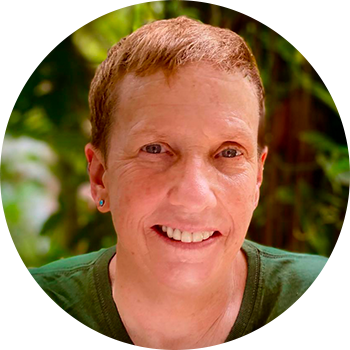
Clancy Cavnar has a doctorate in clinical psychology (Psy.D.) from John F. Kennedy University in Pleasant Hill, CA. She currently works in private practice in San Francisco, and is Co-Founder and a member of the Board of Directors of the Chacruna Institute for Psychedelic Plant Medicines. She is also a research associate of the Interdisciplinary Group for Psychoactive Studies (NEIP). She combines an eclectic array of interests and activities as clinical psychologist, artist, and researcher. She has a master of fine arts in painting from the San Francisco Art Institute, a master’s in counseling from San Francisco State University, and she completed the Certificate in Psychedelic-Assisted Therapy program at the California Institute of Integral Studies (CIIS). She is author and co-author of articles in several peer-reviewed journals and co-editor, with Beatriz Caiuby Labate, of ten books. For more information see: http://www.drclancycavnar.com
Dr. Monnica T. Williams is a clinical psychologist and Associate Professor at the University of Ottawa, in the School of Psychology, where she is the Canada Research Chair in Mental Health Disparities. She is also Clinical Director of the Behavioral Wellness Clinic. Her research focuses on African American mental health, culture, and psychopathology, and she has published over 100 scientific articles on these topics. Current projects include the assessment of race-based trauma, unacceptable thoughts in OCD, improving cultural competence in the delivery of mental health care services, and interventions to reduce racism. She gives diversity trainings nationally for clinical psychology programs, scientific conferences, and community organizations. She currently is Chair of their Academic Training & Education Standards (ATES). She is also a member of the Scientific Advisory Board of the International OCD Foundation, and co-founded their Diversity Council. Dr. Williams is a member of Chacruna’s Racial Equity and Access Committee.
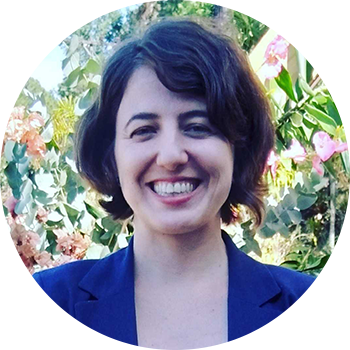
Dr. Lígia Duque Platero is Chacruna’s Education Program Associate. She is a queer, cisgender Brazilian woman. She has an interdisciplinary background in history, anthropology and Latin American studies. She holds a bachelor’s degree in history (2005) and a history teacher training qualification (2006) from the University of São Paulo (USP), in Brazil. She has a master’s degree in Latin American Studies from the National Autonomous University of Mexico (UNAM – 2012) in Mexico City, addressing public policies in relation to Indigenous peoples and Indigenous education in Brazil and Mexico from the 1940s-1970s. She has a doctorate in humanities, with an emphasis on cultural anthropology (2018), from the Federal University of Rio de Janeiro (UFRJ), in Brazil. Her PhD looked at the cultural transformations and exchanges amid the alliance between the Yawanawá Indigenous people and an urban church of Santo Daime. Her main research focus areas are: ayahuasca, Santo Daime, sacred plants, shamanic tourism, Yawanawá (Pano) people, Indigenous policies and human rights in Brazil and Mexico. She is a research associate at the Interdisciplinary Group for Psychoactive Studies (NEIP) and at the Laboratory for the History of Religious Experiences (UFRJ/IFCS) in Brazil.
Dr. Darron T. Smith is a NCCPA-certified physician assistant and faculty member in the department of sociology at the University of Memphis. His areas of research and scholarship examine US-based systems of racial oppression and systemic inequality found in all domains across society, including healthcare, the family (transracial adoption), healthcare disparities, religion, sport, culture, and politics. Dr. Smith’s current research and practice intertwine the study of neurosociology, race-based trauma, and mental illness by looking at the impact of neurofeedback versus MDMA-assisted psychotherapy on brainwave activity in individuals with racial trauma (PTSD) using EEG technology. He is featured in the CBS Sports documentary, The Black 14: Wyoming Football 1969, as well as the Loki Mulholland film on transracial adoption, Black, White & Us: Love is Not Enough. He is the author of When Race, Religion & Sports Collide: Black Athletes at BYU and Beyond. Dr. Smith is a member of Chacruna’s Racial Equity and Access Committee and board member of the American Psychedelic Practitioners Association.
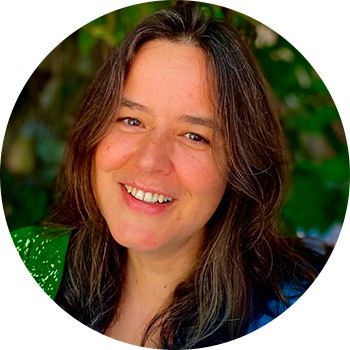
Dr. Beatriz Caiuby Labate (Bia Labate) is a queer Brazilian anthropologist based in San Francisco. She has a Ph.D. in social anthropology from the University of Campinas (UNICAMP), Brazil. Her main areas of interest are the study of plant medicines, drug policy, shamanism, ritual, religion, and social justice. She is Executive Director of the Chacruna Institute for Psychedelic Plant Medicines and serves as Public Education and Culture Specialist at the Multidisciplinary Association for Psychedelic Studies (MAPS). She is also Visiting Scholar at Graduate Theological Union in Berkeley. Additionally, she is Advisor for the Veteran Mental Health Leadership Coalition and the Soltara Healing Center. Dr. Labate is a co-founder of the Interdisciplinary Group for Psychoactive Studies (NEIP) in Brazil and editor of its site. She is author, co-author, and co-editor of twenty-eight books, two special-edition journals, and several peer-reviewed articles (https://bialabate.net).
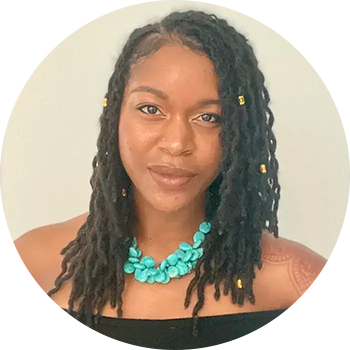
Sia Henry previously worked with the Restorative Justice Project at Impact Justice, supporting community-based organizations and criminal legal system partners around the country in establishing pre-charge restorative justice diversion programs that, without relying on prosecution or incarceration, bring those who have caused and been impacted by harm into healing and accountability processes. She also spent a number of years on conditions of confinement work, engaging in impact litigation and training to improve conditions for incarcerated people with physical and developmental disabilities and mental health issues and those most at risk of sexualized violence. Sia serves on the Board of Directors for Mount Tamalpais College (formerly the Prison University Project) at San Quentin State Prison (the country’s first, tuition-free and independently accredited college situated inside a prison). She also founded the Hood Exchange to introduce formerly incarcerated, Black communities to international travel throughout the African diaspora. Sia graduated from Harvard Law School and Duke University.
Take a minute to browse our stock:
Did you enjoy reading this article?
Please support Chacruna's work by donating to us. We are an independent organization and we offer free education and advocacy for psychedelic plant medicines. We are a team of dedicated volunteers!
Can you help Chacruna advance cultural understanding around these substances?


